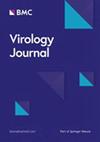Outcomes of COVID-19 in patients with obinutuzumab compared with patients with rituximab: a retrospective cohort study
IF 4
3区 医学
Q2 VIROLOGY
引用次数: 0
Abstract
Patients treated with anti-CD20 monoclonal antibodies could have a higher risk of adverse outcomes of coronavirus disease 2019 (COVID-19). The novel anti-CD20 monoclonal antibody obinutuzumab has shown greater B-cell depletion and superior in vitro efficacy than rituximab. We aimed to assess whether obinutuzumab would result in worse COVID-19 outcomes than rituximab. We retrospectively reviewed 124 patients with B-cell lymphoma, 106 of whom received rituximab treatment and 18 of whom received obinutuzumab treatment. The adverse outcomes of COVID-19 were compared between patients in the two cohorts. The proportions of patients who were hospitalized (55.6% vs. 20.8%, p = 0.005), experienced prolonged severe acute respiratory syndrome coronavirus 2 (SARS-CoV-2) infection (38.9% vs. 2.9%, p < 0.001), and developed severe COVID-19 (33.3% vs. 4.7%, p < 0.001) were higher in patients with obinutuzumab than in those with rituximab. Multivariate analyses showed that obinuzumab treatment was associated with higher incidences of prolonged SARS-CoV-2 infection (OR 27.05, 95% CI 3.75-195.22, p = 0.001) and severe COVID-19(OR 15.07, 95% CI 2.58–91.72, p = 0.003). Our study suggested that patients treated with obinutuzumab had a higher risk of prolonged SARS-CoV-2 infection and severe COVID-19 than those treated with rituximab.与利妥昔单抗患者相比,奥比妥珠单抗患者的COVID-19疗效:一项回顾性队列研究
接受抗CD20单克隆抗体治疗的患者可能有更高的冠状病毒病不良后果风险 2019 (COVID-19)。新型抗CD20单克隆抗体obinutuzumab显示出比利妥昔单抗更强的B细胞耗竭能力和更优越的体外疗效。我们的目的是评估奥比奴珠单抗是否会导致 COVID-19 结果比利妥昔单抗更差。我们对124名B细胞淋巴瘤患者进行了回顾性研究,其中106人接受了利妥昔单抗治疗,18人接受了奥比妥珠单抗治疗。我们对两组患者的 COVID-19 不良反应进行了比较。接受奥比妥珠单抗治疗的患者住院比例(55.6% vs. 20.8%,p = 0.005)、经历长时间严重急性呼吸综合征冠状病毒2(SARS-CoV-2)感染的比例(38.9% vs. 2.9%,p < 0.001)和出现严重COVID-19的比例(33.3% vs. 4.7%,p < 0.001)均高于接受利妥昔单抗治疗的患者。多变量分析显示,奥比奴珠单抗治疗与 SARS-CoV-2 感染时间延长(OR 27.05,95% CI 3.75-195.22,p = 0.001)和严重 COVID-19 (OR 15.07,95% CI 2.58-91.72,p = 0.003)的发生率较高有关。我们的研究表明,与使用利妥昔单抗治疗的患者相比,使用奥比妥珠单抗治疗的患者发生 SARS-CoV-2 延长感染和严重 COVID-19 的风险更高。
本文章由计算机程序翻译,如有差异,请以英文原文为准。
求助全文
约1分钟内获得全文
求助全文
来源期刊

Virology Journal
医学-病毒学
CiteScore
7.40
自引率
2.10%
发文量
186
审稿时长
1 months
期刊介绍:
Virology Journal is an open access, peer reviewed journal that considers articles on all aspects of virology, including research on the viruses of animals, plants and microbes. The journal welcomes basic research as well as pre-clinical and clinical studies of novel diagnostic tools, vaccines and anti-viral therapies.
The Editorial policy of Virology Journal is to publish all research which is assessed by peer reviewers to be a coherent and sound addition to the scientific literature, and puts less emphasis on interest levels or perceived impact.
 求助内容:
求助内容: 应助结果提醒方式:
应助结果提醒方式:


